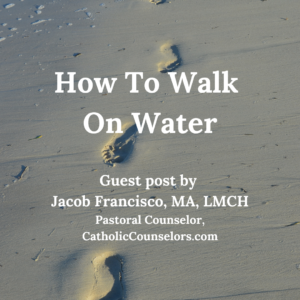Guest Post by Jacob Francisco, MA, LMHC – Pastoral Counselor, CatholicCounselors.com

Anxiety and fear are primal emotions that we all experience to some degree, in big and little ways. The nature of fear and worry is to draw our attention to the object of the feeling, whether inside or outside our head. When we are afraid of something we are alert for that thing and we sometimes see it where it is not actually present. If I am afraid of monsters in the dark, everything in the dark room becomes a possible monster. My perception becomes focused on finding the monsters, so I see them even in ordinary things. If I am worried about an upcoming event, the thoughts about it might be so strong that I stay up at night dwelling on those worries. It can be very difficult to think about anything other than the object of my worry or fear.
Because these emotions take our attention and focus we often cannot see how to deal with them. We become wrapped up within the thoughts and emotions so much that we cannot sleep, have trouble relaxing or find it difficult to think about anything else other than the worry or fear. We may become so paralyzed in a given moment that we are unable to act at all. Maybe we can never think of the right thing to say to our boss or our spouse when they are angry with us. Perhaps we find it difficult to socialize with people in the same room, so we say nothing. Some may have unwelcome and unwanted thoughts come into our mind that take our peace or cause a whole chain of strong emotions and regrettable actions and we become distraught that we cannot seem to be rid of the thoughts.
Recall the story of Jesus and Peter walking on the water. (It is Matthew 14:22-33 if you want to read the whole thing). The disciples in the boat see what they think is a ghost walking through the wind and across the water. Peter calls out to Jesus, walks on the water, and then sinks.
Now here is the key: when Peter “saw the wind” he was afraid, and began to sink. It was fear that caused his sinking. Why? It is precisely the moment that Peter gives attention to the wind that he is no longer focused on Christ. When his focus was on Christ, he could walk across the waves. When he was focused on what brought fear, he sank. He moved towards the object of his gaze. When he took those first steps towards Christ, nothing happened to the wind and the waves. Those remained as strong as ever. His focus on Christ allowed him to move beyond the fear that they instilled.
The disciples were in the boat and very much aware of the wind and waves. So we begin by acknowledging our fears and worries. The avoidance of what causes our fear or worry is a natural strategy for managing these feelings, and we do it because it works for a time. The reality is that this only increases our anxiety over the long term. This becomes a cycle which can get out of control. We must see and acknowledge our wind and waves.
Then we turn our gaze to the healthy thing. This new object of focus can be internal or external. Internally, we can focus on a comforting Scripture verse, a mental image of God or His saints, or some other holy thing. Scripture encourages us to “Set your minds on things that are above” (Col 3:2). When we are confronted with the thoughts and feelings of fear or worry, we need to turn our gaze, or set our mind, on Christ in this way. This is not an easy thing to do. Your attention will wander. The fear or worry will make every attempt to regain your attention. This is unavoidable. Peter was unable to walk all the way to Christ on his first attempt.
Because this can be so challenging, we often need to begin on a more natural level and work our way up to the mental strength to hold an image of Christ in our minds. God created us with a body, and our body is good. We were made to interact with the world in a physical manner. God communicates His grace to us through physical reality every day. The Sacraments and sacramentals convey grace through physical means. Physical things are easier to focus on amid anxiety and fear. If I am having strong unwanted thoughts in my mind, turning my focus to the things my five senses tell me can be very effective. If I am focused on my senses or what my body is telling me, it helps me to move through the thoughts by allowing me to not become overwhelmed.
Each step we take in life, whether spiritual, or emotional, or physical, needs to be with the awareness of grace. God is constantly pouring out His love and grace, that we might be overcomers and conquerors of sin and evil. We have to accept this grace, allow it to fill us consciously so that all our actions move with the strength of that grace.
The next time that you feel afraid or worried, remind yourself of the presence of God’s grace, focus on the healthy thing and take a step out onto the water.
To learn more about Jacob Francisco’s work, visit CatholicCounselors.com